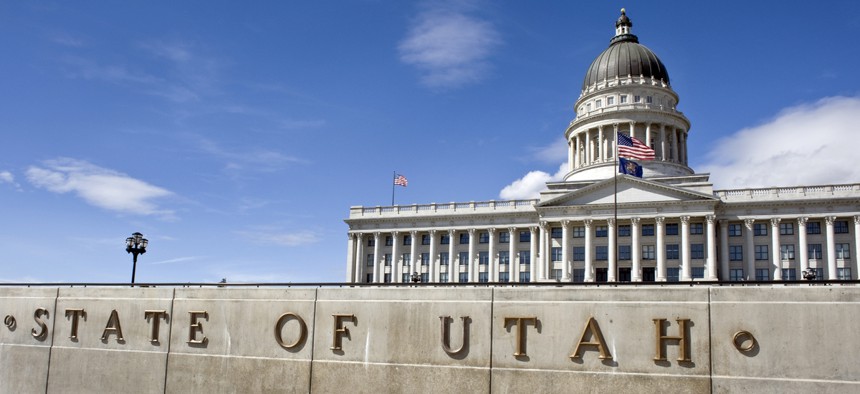Cracking Down on 'Disruptions' of Government Meetings

The Utah Senate on Thursday unanimously passed a bill that would increase penalties on protesters who disrupt public government meetings. Shutterstock

Connecting state and local government leaders
The Utah state Senate unanimously passed a bill that the sponsor said is meant to "create civility." It would increase penalties for protests or other disruptions of public meetings.
The Utah Senate on Thursday unanimously passed a bill that would increase penalties on protesters who repeatedly disrupt public government meetings.
The legislation applies to any meeting of the state legislature, legislative caucuses, task forces or working groups, as well as town hall meetings organized by state lawmakers. Though not explicitly named, it also seems to cover government meetings more broadly, such as city council and other local meetings. The proposal says it be illegal for an individual to “intentionally disrupt or disturb an official meeting or engage in disorderly conduct at an official meeting.”
The bill creates an escalating punishment scheme. A disruption by a first-time offender would be a misdemeanor that could receive a punishment of up to 90 days in jail and a fine as high as $750. A second offense would carry a possible sentence of up to 180 days in jail and a $1,000 fine. By the third offense, protesters could face up to a year in jail and a $2,500 fine.
Republican state Sen. Don Ipson sponsored the bill, which he said was meant to “create civility.” He declined a request for comment, but during floor debate said that protesters “have every right in the world to free speech. They don’t have the right to disrupt the meeting to the point that it’s disorderly conduct.”
Democratic state Sen. Gene Davis questioned whether lawmakers might be sued over enforcing the law. “I really wonder if we aren’t setting ourselves up as legislators if we try to quell an uprising, if you would, and it may step on somebody’s free speech and they could sue us,” he said.
State Sen. Kathleen Riebe, also a Democrat, said she shared some of Davis’ concerns around free speech. “I do understand that meetings need to move forward in an official way,” she said. “But in the same regard we need to honor that people don't always agree with us and that is part of the process as well.”
Ipson replied that the bill “doesn’t impact free speech at all” but focuses on disorderly conduct. Both Riebe and Davis eventually voted in favor of the bill. No state senators voted against the measure, although four were absent or didn’t vote.
Speaking with Route Fifty on Friday, Davis said that he was concerned about town halls he has in his district, which fall under the category of protected meetings in the bill. “Town hall meetings are where most elected officials talk to their constituents,” he said. “I don’t have security at my meetings, because a town hall is a free and open forum. It may be uncomfortable, but we should have that space for conversation, especially for legislative issues.”
As for why he voted for the bill despite his concerns that he might be sued on free speech grounds, Davis said, “I just figured, what the heck, I raised my concerns.”
Many observers suspect that Ipson’s bill is motivated by the recent ramp-up in protests about the development of an inland port in Salt Lake City. The port would create a huge import and export trading hub on the city’s northwest side, connecting Salt Lake to major seaports on the west coast.
Ipson said his bill was “not necessarily” a response to the protests of the port authority—but Utah media have noted he does own property in the port authority’s boundaries, as well as a trucking company, DATS Trucking Inc. He has also served as the president of the Southern Utah Trucking Association and the Utah Trucking Association. Estimates project that the inland port would create about 11,600 new truck trips per day, a boon for the trucking industry.
Environmentalists have been protesting the development of the port since 2018. Deeda Seed of the Campaign for Biological Diversity said in a press conference in January that the pollution from trucks would negatively impact the local environment. “We have concerns about the transportation issues, the air quality issues, the impact to wetlands and bird species, the climate change implications and the environmental justice issues associated with this,” Seed said. “The communities that are going to be most directly and immediately impacted are our most vulnerable communities already.”
Civil Riot, a protest collective that helped orchestrate a 2019 protest of the port that led to eight arrests, said in a statement that the bill now before the Utah House would “criminalize dissent,” but that the group would not be dissuaded by it.
"Like many governments throughout history, the Utah state legislature acts on behalf of those with wealth and power, particularly developers, logistics companies, and fossil fuel interests. The legislature's actions go against the interests of people,” the group said. “Many of us already face multiple misdemeanors and felonies for taking action on behalf of clean air, water, and land. But we continue rising and building with one another, even as politicians implement, and police enforce laws that criminalize our right to redress our grievances.”
Emma Coleman is the assistant editor for Route Fifty.
NEXT STORY: Blood Drives Fall Off As Coronavirus Worries Grow





